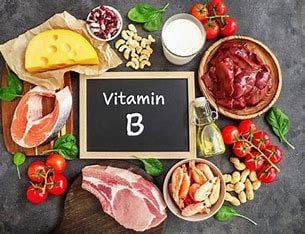1. Vitamin B and C deficiency results in periodontal disease.
Vitamin B and C deficiency has a major impact on oral health and is the main cause of periodontal disease. Here are some details about the impact of vitamin B and C deficiency on oral health:
1.1. Vitamin B deficiency
Vitamin B1 (thiamine) deficiency: systemic manifestations are beriberi: paralysis, cardiovascular symptoms, edema, loss of appetite. In the mouth: mucosal sensitivity, small blisters on the cheek mucosa, under the tongue, palate, oral mucosal erosion.
Vitamin B2 (riboflavin) deficiency: glossitis, angular cheilitis, seborrheic dermatitis, keratitis due to damage to superficial blood vessels. Glossitis is characterized by atrophy of the gingival papillae and purple patches, in mild and moderate cases, the back of the tongue has atrophied taste papillae. In severe cases, the entire surface of the back of the tongue is flat, dry, and grooved. Angular cheilitis begins with an inflammatory lesion at the corner of the mouth, followed by erosion, ulceration, and fissures. Note that angular cheilitis is not only caused by riboflavin deficiency but also by many other causes such as: fungus found in debilitated people.
Vitamin B3 (niacin) deficiency: Dermatitis, glossitis, stomatitis, gastrointestinal mucosal inflammation, diarrhea, neurological and psychiatric symptoms. Common manifestations in the gums are necrotic ulcers, often at sites of local irritation. Other symptoms include: black tongue, gingivitis, gingival destruction, damage to the periodontal ligament and alveolar bone.
Vitamin B9 (folic acid) deficiency: systemic manifestations are anemia, immature red blood cells: damage to the gastrointestinal mucosa, diarrhea; oral manifestations: non-inflamed gums, periodontal ligament and alveolar bone, gingival mucosal inflammation. Ulcerative stomatitis is an early symptom of leukemia causing folic acid deficiency
1.2. Vitamin C deficiency
Vitamin C is a powerful antioxidant that helps maintain the body’s overall health and strengthens the immune system.– Vitamin C deficiency can lead to symptoms such as bleeding gums, gingivitis and swollen gums, and loose teeth.– Without adequate vitamin C, the body will have difficulty producing collagen, an important substance that helps keep teeth and gums healthy. Causing slow or no bone formation, damage to bone-forming cell function. Vitamin C deficiency increases capillary permeability, susceptibility to bleeding when traumatized, reduces peripheral vasoconstriction, and slows blood circulation.
2. Sources of vitamin B, C.
To fully supplement vitamin B and C in your daily diet, you can look for the following sources:
2.1. Vitamin B
Meat, fish and poultry: are the best sources of vitamin B, especially vitamin B12.– Beans and seeds: such as soybeans, green beans, black beans, peanuts, pine nuts, chia seeds… are excellent sources of vitamin B.– Green vegetables: such as kale leaves, spinach, water spinach, celery and coriander, they contain a lot of vitamin B9 (folic acid).

2.2. Vitamin C
Fruits: such as oranges, lemons, tangerines, strawberries, kiwis, apples, grapes, bananas, watermelons… are all great sources of vitamin C.– Green vegetables: such as kale, broccoli, spinach, tomatoes, carrots, peppers, onions, coriander leaves… are all rich in vitamin C.– Dairy products: such as fresh milk, yogurt and cheese are also sources of vitamin C, especially cheese.
Adding enough B and C vitamins to your daily diet not only helps maintain oral health but is also an effective way to improve your overall health. You can also use vitamin B and C supplements, however, before using them, you should consult your doctor or nutritionist to ensure safety and effectiveness.
3. Advice from experts.
To maintain good oral health, you need to follow some nutritional and oral care tips. Here are some useful tips:
3.1. Supplement with enough vitamins B and C
You should supplement foods rich in vitamins B and C in your daily diet to help maintain the best oral health.– You can find sources of vitamins B and C in foods such as meat, fish, poultry, beans, nuts, green vegetables, fruits and dairy products.
3.2. Oral care
Brush your teeth properly: you should brush your teeth at least twice a day for at least 2 minutes. Make sure to brush all sides of your teeth and use a fluoride toothpaste to help prevent tooth decay.– Floss: use dental floss to clean between your teeth, where your toothbrush cannot reach.– Use mouthwash: use mouthwash containing fluoride to help prevent tooth decay and maintain fresh breath.– Avoid eating too many sweets: sugar and sweet foods can increase the growth of bacteria that cause tooth decay. You should limit your intake of sweets and take care of your teeth regularly to minimize their impact.
In summary, adequate intake of vitamins B and C and proper oral care are two important factors to help maintain good oral health, prevent periodontal disease and ensure the overall health of the body. If you have any problems related to your oral health, consult your doctor or dental specialist for timely advice and treatment.
4. Conclusion.
Thus, adequate supplementation of vitamins B and C in the daily diet and proper oral care are very important to maintain good oral health and prevent periodontal disease. Deficiencies of vitamins B and C can lead to oral health problems such as periodontitis, gingivitis, tooth decay and periodontal disease, so adequate supplementation of these vitamins is essential.
In addition, we also need to take proper care of our oral health by brushing our teeth properly, using fluoride mouthwash, flossing and limiting sweets to minimize their impact on oral health.
In summary, nutrition and oral care are two important factors to maintain good oral health, prevent periodontal disease and ensure the overall health of the body. Adding enough B and C vitamins to your daily diet and taking proper care of your teeth will help you have healthy teeth and avoid problems related to oral health.





